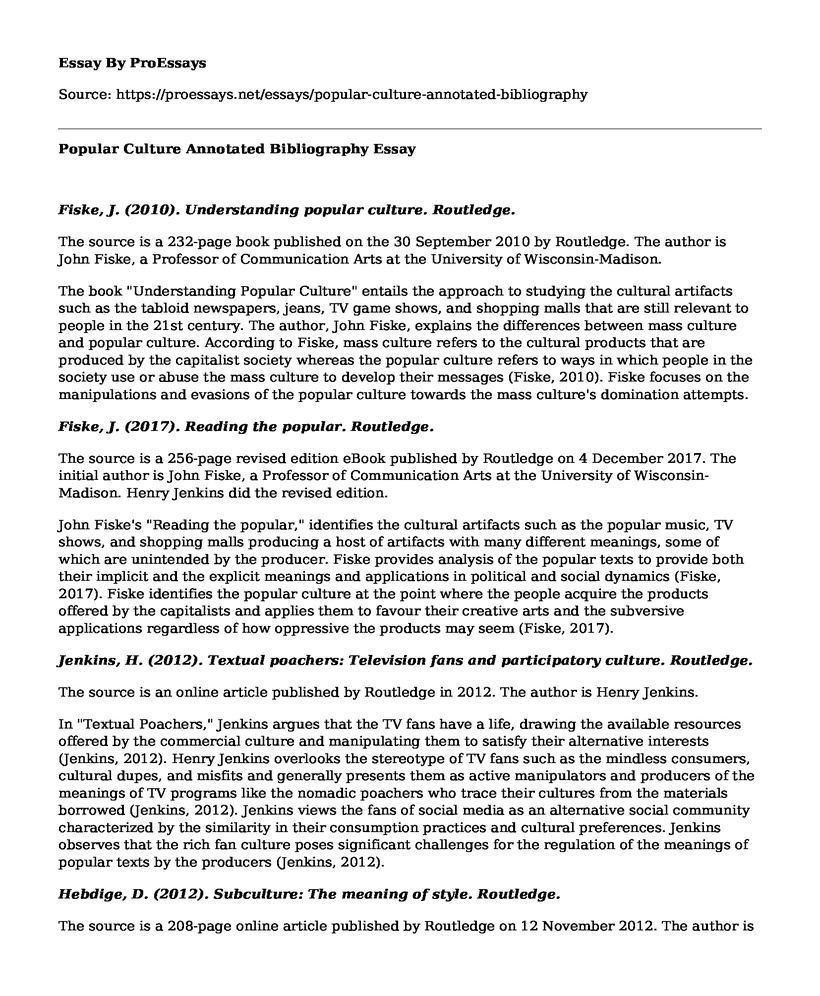Fiske, J. (2010). Understanding popular culture. Routledge.
The source is a 232-page book published on the 30 September 2010 by Routledge. The author is John Fiske, a Professor of Communication Arts at the University of Wisconsin-Madison.
The book "Understanding Popular Culture" entails the approach to studying the cultural artifacts such as the tabloid newspapers, jeans, TV game shows, and shopping malls that are still relevant to people in the 21st century. The author, John Fiske, explains the differences between mass culture and popular culture. According to Fiske, mass culture refers to the cultural products that are produced by the capitalist society whereas the popular culture refers to ways in which people in the society use or abuse the mass culture to develop their messages (Fiske, 2010). Fiske focuses on the manipulations and evasions of the popular culture towards the mass culture's domination attempts.
Fiske, J. (2017). Reading the popular. Routledge.
The source is a 256-page revised edition eBook published by Routledge on 4 December 2017. The initial author is John Fiske, a Professor of Communication Arts at the University of Wisconsin-Madison. Henry Jenkins did the revised edition.
John Fiske's "Reading the popular," identifies the cultural artifacts such as the popular music, TV shows, and shopping malls producing a host of artifacts with many different meanings, some of which are unintended by the producer. Fiske provides analysis of the popular texts to provide both their implicit and the explicit meanings and applications in political and social dynamics (Fiske, 2017). Fiske identifies the popular culture at the point where the people acquire the products offered by the capitalists and applies them to favour their creative arts and the subversive applications regardless of how oppressive the products may seem (Fiske, 2017).
Jenkins, H. (2012). Textual poachers: Television fans and participatory culture. Routledge.
The source is an online article published by Routledge in 2012. The author is Henry Jenkins.
In "Textual Poachers," Jenkins argues that the TV fans have a life, drawing the available resources offered by the commercial culture and manipulating them to satisfy their alternative interests (Jenkins, 2012). Henry Jenkins overlooks the stereotype of TV fans such as the mindless consumers, cultural dupes, and misfits and generally presents them as active manipulators and producers of the meanings of TV programs like the nomadic poachers who trace their cultures from the materials borrowed (Jenkins, 2012). Jenkins views the fans of social media as an alternative social community characterized by the similarity in their consumption practices and cultural preferences. Jenkins observes that the rich fan culture poses significant challenges for the regulation of the meanings of popular texts by the producers (Jenkins, 2012).
Hebdige, D. (2012). Subculture: The meaning of style. Routledge.
The source is a 208-page online article published by Routledge on 12 November 2012. The author is Dick Hebdige.
The book entails the music-centred subcultures of the white working-class. In this book, Dick Hebdige conveys beneficial information concerning the popular music genres of the rock era. He also attempts to draw subject of the various movements of the youth protests in Britain during the period of the sort of Marxist's analytical techniques that were propagated by Roland Barthes. Hebdige examines the meaning of various magnificent exterior fashions associated with the sub-cultures of the working-class youths (Hebdige, 2012). He unveils the hidden meanings of such styles using the advanced theoretical apparatus which combines Marxism, sociology of deviance, and semiotics (Hebdige, 2012).
References
Fiske, J. (2010). Understanding popular culture. Routledge.
Fiske, J. (2017). Reading the popular. Routledge.
Hebdige, D. (2012). Subculture: The meaning of style. Routledge.
Jenkins, H. (2012). Textual poachers: Television fans and participatory culture. Routledge.
Cite this page
Popular Culture Annotated Bibliography. (2022, Jul 17). Retrieved from https://proessays.net/essays/popular-culture-annotated-bibliography
If you are the original author of this essay and no longer wish to have it published on the ProEssays website, please click below to request its removal:
- Letter on Difference in Traditions Between America and India
- Death and Dying Practices in Shintoism Essay Example
- Violin Concerto of Alban Berg Essay Example
- Paper Example on the Harlem Renaissance: An Era of African-American Empowerment
- Cultural Diversity: Learning and Growing Through Interaction and Culture Shock - Essay Sample
- Family Struggles: Examining Socioeconomic Impact of Cancer - Essay Sample
- Essay Example on Native American Women & Sterilization: Unique Vulnerability







